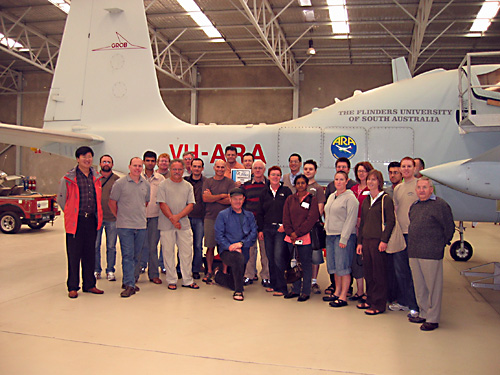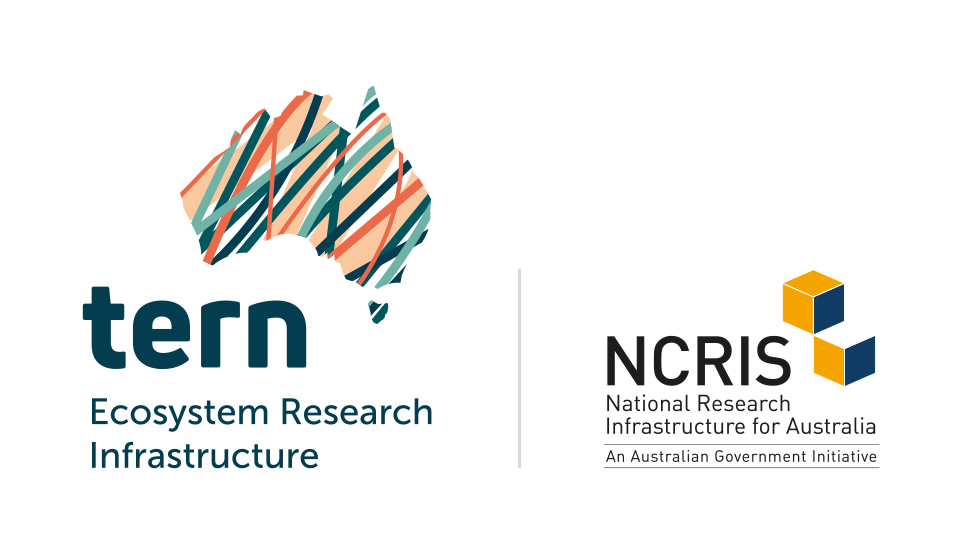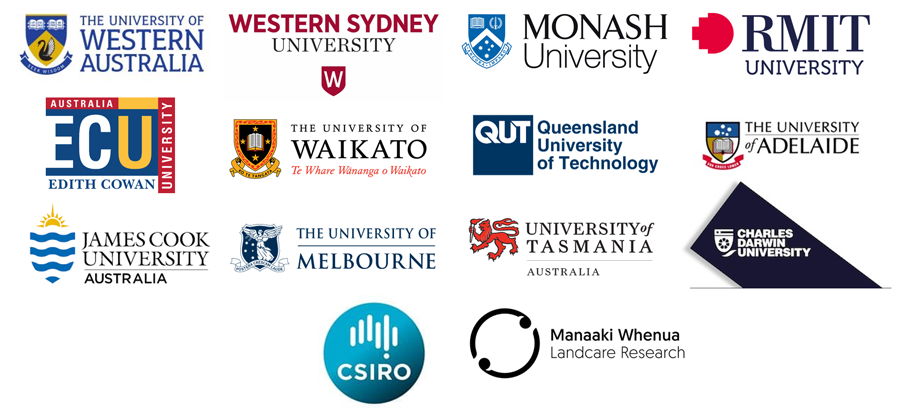
Upcoming events:
|
OzFlux Conference and Data Workshop 2024 This year the OzFlux Conference and data workshop is headed west, to Perth, WA. Whether you're new to the OzFlux community, a long-time member, or not a member but interested to hear more about what we do, there's something for everyone at OzFlux's annual Conference and Data Workshop event. The Data Workshop: 11th - 15th November 2024Get more information and register for the OzFlux Data Workshop 2024 The Conference: 18th - 20th November 2024Get more information, submit your abstract, and register for the OzFlux Conference 2024 |
|
Ecological Society of Australia annual meeting (ESA 2024) 9th-13th December 2024 Abstracts open on 11 April 2024 For more information see the ESA 2024 website |
|
American Geophysical Union annual meeting (AGU24) 9th-13th December 2024 For more information see the AGU24 website |
Previous Webinars:
|
Dr Matt Garthwaite, Dr Megan Lewis and Dr William Woodgate Australia's role in Calibrating and Validating Earth Observations from ground sites 3rd July 2024, 15:00 - 16:00 AEST Have you ever thought about what would happen if the supply of on-ground monitoring data required for calibration and validation of Earth Observation (EO) data is 'turned off' by the country that provides it? In Australia, the use of images collected from satellites, aircraft and uncrewed airborne systems to produce maps of features of the surface of the earth underpins economic activity worth many billion dollars of per year. EO data are used in many applications ranging from daily weather prediction, supporting agricultural production, biosecurity and environmental monitoring. For Australia's environmental monitoring responsibilities alone, which extend well beyond the Australian landmass to its oceans and outlying territories, information can often only be cost-effectively gathered by using EO data from satellites. What many people don't realise is that the world's Earth Observation data are reliant on the instruments, surveys and standard protocols used by agencies such as TERN and its counterpart environmental observatories around the world. The contextual, site-based data from TERN, IMOS and similar observatories ensures information coming from satellites etc is an accurate representation of what's happening on the ground. This webinar highlights the respected role of Australia in supporting the world's space agencies to deliver verifiable satellite imagery data, the breadth of expertise, sensors and sites that are critical in ensuring that world-wide data products are accurate and reliable for Australia and beyond, and the emerging technologies that are helping to bridge the data gap between sites and satellites. |
|
Dr Peter Isaac and Prof. Elise Pendall Estimating ecosystem respiration from flux tower and chamber data: 18th August 2021, 14:00 - 15:00 AEST This talk uses the experiences at the Cumberland Plain Woodland SuperSite to explore methods of improving the quality of TERN OzFlux data and indicators of data quality. It also provides insight into the uncertainty inherent in data partitioning techniques. Reducing this uncertainty has contributed to a better understanding of the sensitivity of Australian ecosystems to climate warming. |
|
Dr Jamie Cleverly The ecological processes that shape Australia's ecosystems 4th May 2021, 12:00 - 13:00 AEST In this OzFlux webinar, Jamie will discuss the inference of the ecological patterns and processes which shape Australian ecosystems. The webinar will showcase how measurements of fluxes, vegetation structure and ecological processes are being used to understand how and why ecosystem change occurs over minutes, days, seasons and years. |
|
Dr Caitlin Moore Bioenergy crop fluxes and an a-maize-ing conundrum 4th March 2021, 13:00 AEDT As we enter an age of biofuel innovation, research efforts have focused on how bioenergy crops alter the carbon, water and energy cycles of the landscape. With the growing push for more sustainable and clean energy sources, alternatives to the main bioenergy crops, such as corn and soybean, are likely to become more widespread in the future. Dr Caitlin Moore of the University of Western Australia will present findings from her research, including data from long-term monitoring equipment installed in bioenergy and food crops, the impacts of land conversion on carbon and nitrogen cycles, and an a-maize-ing flux conundrum. |
Presentations from previous OzFlux Events held in:
|
July 2020 - 20th year celebration August 2018 - Combined OzFlux/Asia Flux meeting |
** all links below open a new window |
|
|
|
| July 2020 - Online. 20th year celebration | |
|---|---|
|
|
| July 2019 - Brisbane, QLD | |
| Coming Soon | |
| August 2018 - Darwin, NT. Combined OzFlux/Asia Flux meeting | |
| Coming Soon | |
| November 2017 - Sydney, NSW | |
|
|
| July 2016 - Calperum Station, SA | |
|
|
| November 2015 - Hobart, TAS | |
|
|
| September 2014 - Alice Springs, NT | |
|
|
| July 2013 - Cairns, QLD | |
|
|
| July 2012 - methven, nz | |
|
|
| June 2012 - OCE Cutting Edge Symposium: Carbon-Water | |
|
|
| June 2011 - perth, wa | |
|
|
| February 2010 | |
|
|
| june 2009 |
|
|
|
| February 2008 |
|
OzFlux group 2008 |
|




